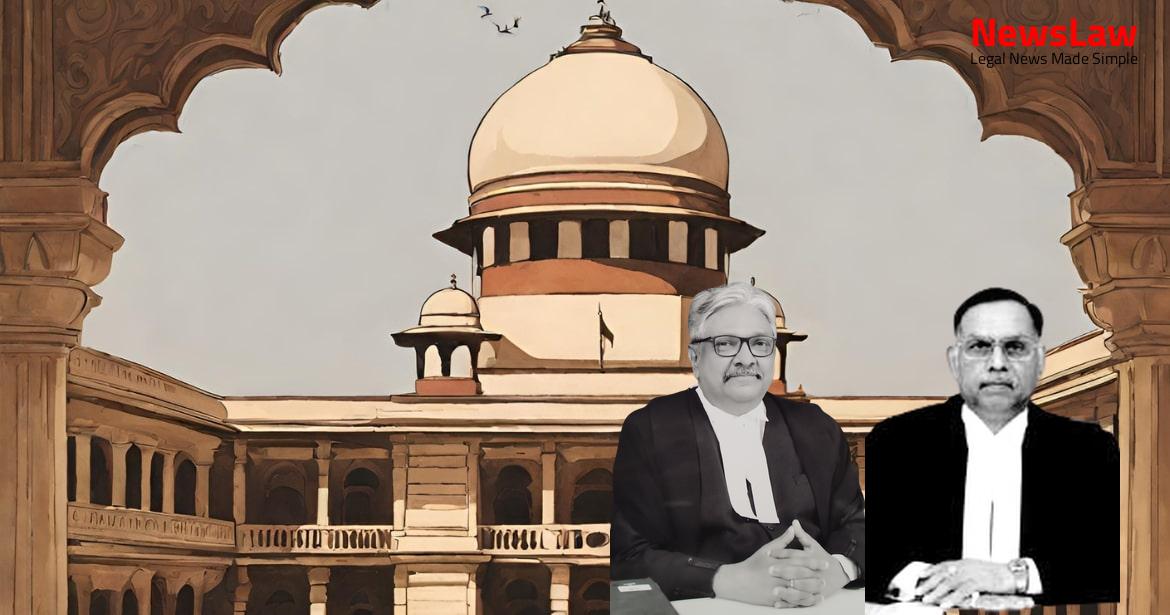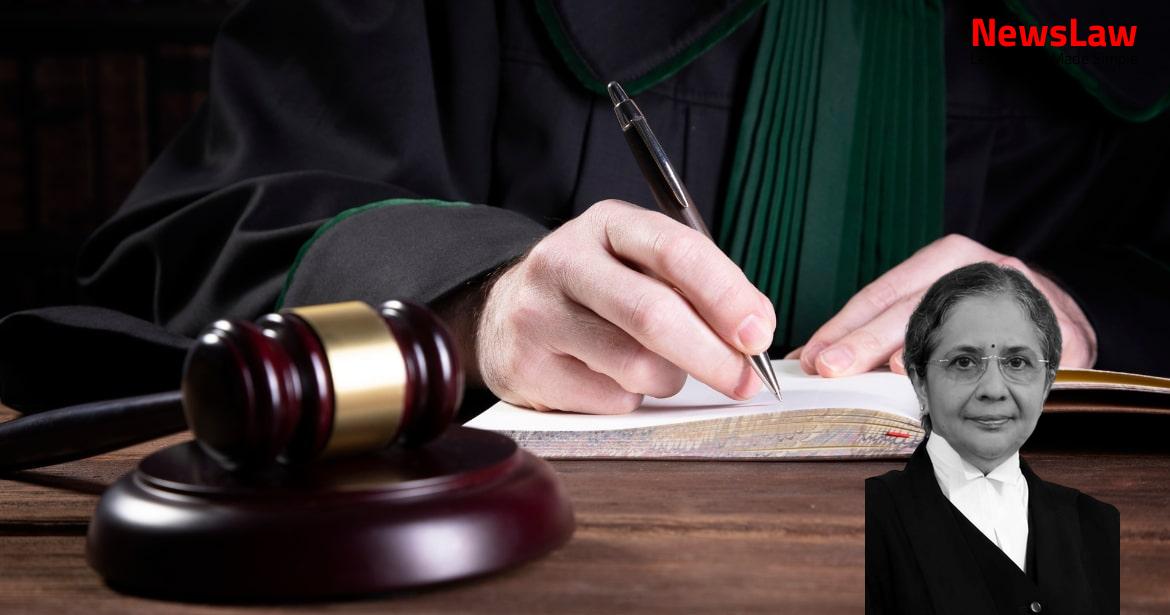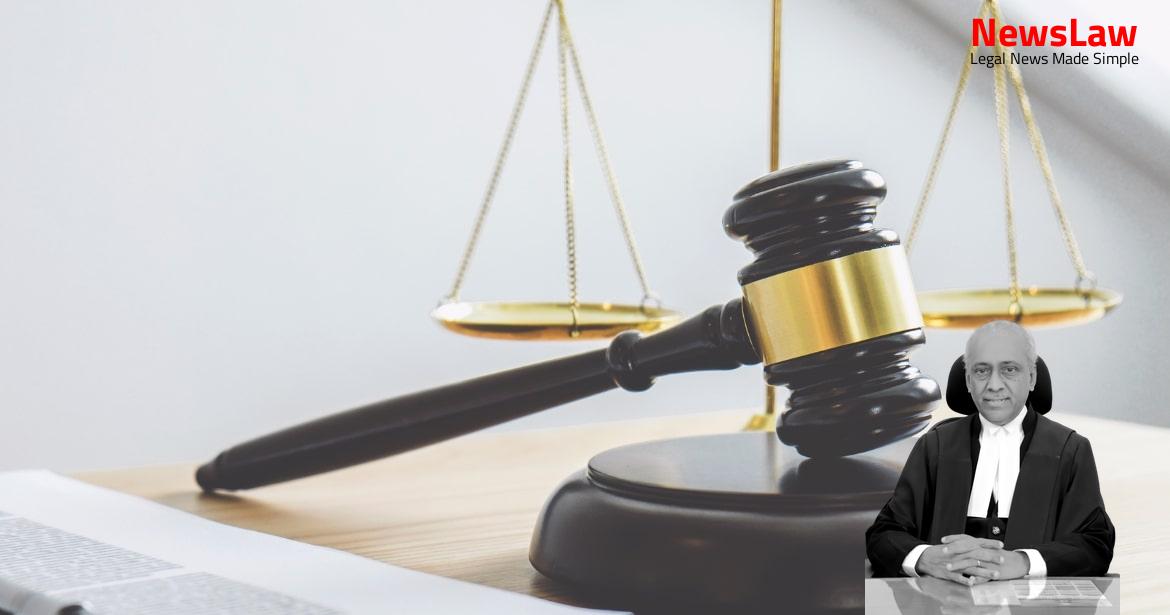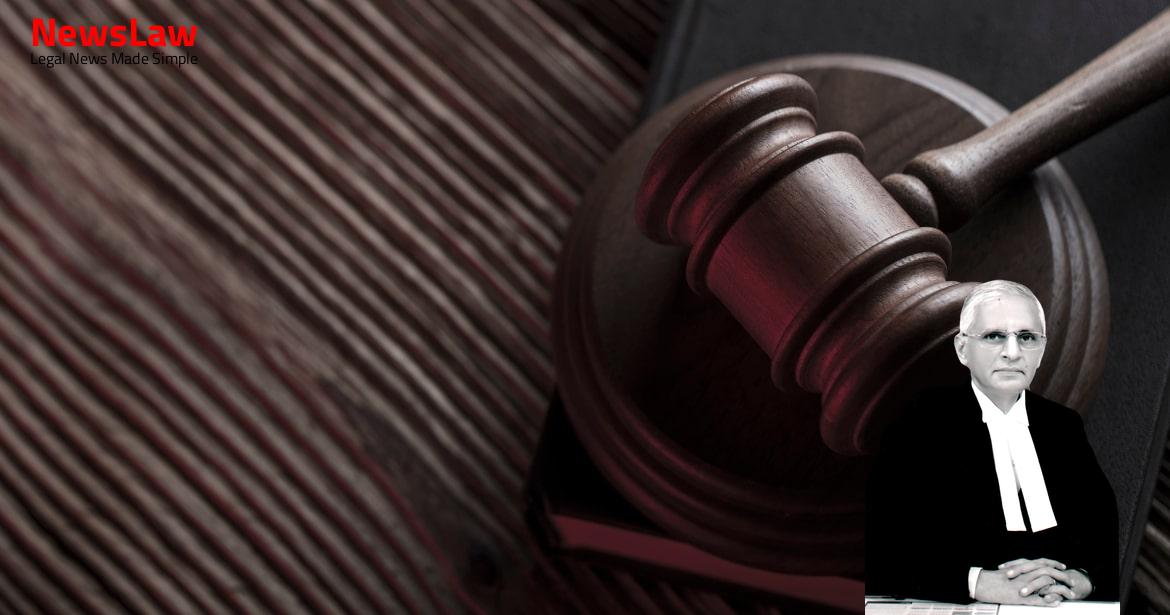In a recent judgment by the Supreme Court of India, the interpretation of Section 32B of the Narcotic Drugs and Psychotropic Substances Act, 1985 was scrutinized in the case of The State v. XYZ. The court delved into the complexities of sentencing structures and factors influencing punishment in cases related to narcotics. Join us as we dissect the legal analysis and implications of this crucial case.
Facts
- Aggrieved against the judgment of the High Court dated 17.04.2018, this appeal has been filed.
- The appeal challenges the conviction and sentence under Section 21(C) of the Narcotic Drugs and Psychotropic Substances Act, 1985.
- The Additional District & Sessions Judge had convicted and sentenced the appellant under Section 21(c).
- The High Court partly allowed the appeal filed by the appellant, maintaining the conviction but reducing the sentence.
- High Court reduced the sentence to sixteen years rigorous imprisonment with a fine of Rs. 2 lakh.
- In default of payment of the fine, appellant was to undergo simple imprisonment for six months.
- This Court issued notice on 26.11.2018 limited to the quantum of the sentence.
Also Read: Entitlement to Back Wages: Upholding Justice
Issue
- The issues at hand revolve around whether the trial court could award punishment higher than the minimum term of imprisonment in the absence of specific factors listed in Section 32B.
- The discussion also delves into whether the trial court is limited to considering only the factors mentioned in clauses (a) to (f) when imposing a punishment higher than the minimum term of imprisonment.
- Both issues are interconnected and will be addressed together.
Also Read: Remand Order Upheld: Legal Analysis in The Case of The National Investigation Agency vs. The State
Arguments
- Learned counsel for the appellant argues that the appellant should not have been awarded a sentence exceeding ten years, which is the minimum sentence for the offense under Section 21(c) of the Narcotic Drugs and Psychotropic Substances Act, 1985.
- The appellant’s counsel points out that the lower court did not consider Section 32B of the Act and failed to establish any grounds from clauses (a) to (f) that would justify a sentence higher than the minimum prescribed by law.
- Referring to a judgment of the Allahabad High Court in Raj Kumar Bajpaee vs State of U.P., (2016) 95 ACrC 896, the appellant’s counsel asserts that without satisfying the factors outlined in Section 32B, a higher sentence cannot be imposed beyond the minimum punishment.
- Emphasizing that the presence of aggravating factors listed in clauses (a) to (f) of Section 32B is necessary for an enhanced sentence, the appellant’s counsel contends that since no such factors are evident in the present case, the appellant should have been sentenced to the minimum term of imprisonment, which is ten years for the offense under Section 21(c).
- The respondent has relied on the judgment of Allahabad High Court in Ram Asre Vs. State of U.P.
- In this judgment, another single judge of the Allahabad High Court stated that the court is not obligated to consider factors listed in clauses (a) to (f) of Section 32B when giving a punishment higher than the minimum prescribed.
- The main issues in the present appeal revolve around the interpretation of Section 32B of the Narcotic Drugs and Psychotropic Substances Act, 1985.
Also Read: Supreme Court Ruling on Recruitment Rules Challenge
Analysis
- Section 31 was substituted by Act 9 of 2001, providing for punishment for subsequent offences
- Section 32B was inserted by Act 9 of 2001, outlining punishment for contravention in relation to manufactured drugs and preparations
- Factors for imposing higher than minimum punishment are listed in Section 32B
- The Amendment Act aimed to rationalize the sentencing structure under the Narcotic Drugs and Psychotropic Substances Act, 1985
- Court can consider factors beyond those enumerated in clauses (a) to (f) for imposing a higher punishment
- For possession of a manufactured drug equivalent to commercial quantity, punishment under Section 21(c) is not less than ten years, extendable to twenty years
- The Amendment Act aimed to provide deterrent punishment for offences related to illicit trafficking in narcotic drugs and psychotropic substances
- Statutes enacting an offense or imposing a penalty are strictly construed.
- Addicts tend to avoid invoking provisions of the Act due to trial delays.
- Different sections of the Act prescribe various punishments.
- Factors in Section 32(B) were not present to warrant higher than minimum punishment.
- Legislative policy on sentencing not clear when both minimum and maximum punishments are prescribed.
- Judges have discretion to impose higher punishment based on factors beyond those in Section 32(B).
- Accused appellant had a license for a retailer shop of Bhang.
- Appellate court modified the sentence to 10 years R.I. and a fine of Rs.1 lakh.
- Punishment quantity based on actual drugs possessed is relevant.
- High Court justified a higher than minimum punishment based on possession exceeding commercial quantity.
- Sentence reduced from 16 years to 12 years considering appellant was a carrier.
- Substance quantity charged is a relevant factor in determining punishment.
- Act has severe punishments for drug traffickers and a reformative approach for addicts.
- Some sections of the Act specify minimum and maximum punishments.
- Imposing punishment higher than minimum should have reasons specified in the judgment.
- Court may consider various circumstances of the accused and the offense before awarding the sentence.
- Court’s discretion to impose higher punishment is not limited by factors in Section 32(B)(a-f).
- Substituting words in the statute is wrong and dangerous.
- Court can award punishment higher than the minimum prescribed based on grounds mentioned in Section 32B.
- Argument to curtail punishment due to factors not considered by the lower court is not valid.
- The punishment awarded by the trial court based on the quantity of substance is justified.
- Factors other than those in Section 32B can be examined by higher courts when imposing a higher punishment.
- Enactment being a penal provision should be interpreted cautiously.
- Construction requiring addition or substitution of words should be avoided.
- The discretionary nature of ‘may’ in Section 32B indicates the court’s discretion in determining punishment.
- The intention of the legislature is primarily gathered from the language used in the statute.
- Reading words into an act should only be done if absolutely necessary.
- Quantity of substance is a relevant factor when determining punishment, even though not specifically mentioned in Section 32B.
- Court’s consideration of the quantity of substance in determining punishment is not an error.
- Judicial references to Section 32B in Krishna Murari Pal case and Ram Asre case highlight the discretion of the court in imposing punishment.
- The award of a sentence higher than the minimum can be reviewed by higher courts.
Case Title: RAFIQ QURESHI Vs. NARCOTIC CONTROL BUREAU EASTERN ZONAL UNIT
Case Number: Crl.A. No.-000567-000567 / 2019



